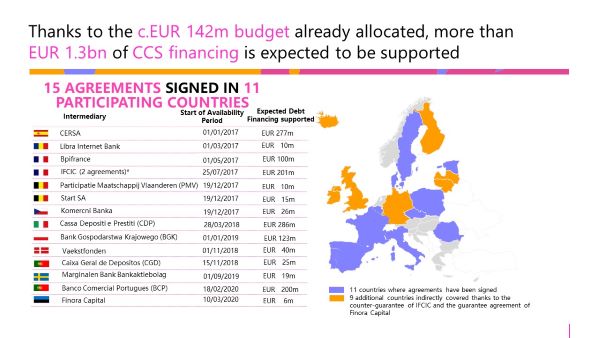The Cultural and Creative Sectors Guarantee Facility helps businesses in the cultural and creative sectors to scale up and become more competitive.
Watch the European Investment Fund video on how to become a successful creative
A new financial instrument for small and medium-sized enterprises
Access to finance is more challenging for small and medium-sized enterprises (SMEs) in the cultural and creative sectors than for conventional SMEs. This is in part due to the intangible nature of their assets, the niche nature of some markets, and the lack of familiarity of the sector’s specificities by the financiers.
To address these challenges, the European Commission has designated over €250 million to guarantee loans for enterprises from creative sectors. The Cultural and Creative Sectors Guarantee Fund (CCS GF) will guarantee up to €2 billion of new loans for thousands of cultural and creative SMEs.
Currently, a total of 15 transactions in 11 countries have been signed and those 15 transactions are expected to generate €1.3 billion of debt financing for companies from the cultural and creative sectors. Several new transactions are currently in the assessment process within the European Investment Fund.
At the end of 2019, debt financing of €424.4 million was made available to 1,547 cultural and creative sector SMEs and to 2,013 projects, as some companies benefit from more than one loan. This financing supported projects worth, in total, over €1.08 billion.
The CCS GF and COVID-19
The importance of the CCS GF as an instrument for responding to the COVID-19 crisis has been widely recognised at the political level.
The European Commission and the European Investment Fund are preparing a set of adaptations to the CCS GF agreement to allow for more flexibility in repayments of loans, to give more security to the financial institutions and to continue the build up of a portfolio of loans.
How does the CCS GF work?
Through the CCS GF the Commission has committed to partially covering financial intermediaries' potential losses on a portfolio level on loans provided for cultural and creative sector projects. By doing this, it hopes to encourage the engagement of financiers with the sector.
The CCS GF is structured as a capped portfolio guarantee with coverage that reaches up to 70% of the losses of each individual loan and up to a maximum rate of 25% of the financial intermediary’s overall portfolio of CCS loans.
The EU guarantee is provided free of charge to selected financial intermediaries and can take the following 2 forms:
- direct financial guarantee to banks, debt (loan) funds and other financial intermediaries who extend loans, financial leases or bonds to cultural and creative sector SMEs;
- financial counter-guarantee to guarantors, who issue guarantees to banks and other financial intermediaries in respect of loans and/or financial leases to cultural and creative sector SMEs.
In addition to the guarantee in place, financial intermediaries under the CCS GF can benefit from free of charge capacity building services aiming to tackle the lack of expertise when it comes to financing CCS. Those services take the form of technical assistance and knowledge or networking-building services provided by a capacity-building provider contracted by the European Investment Fund. The aim of these services is to train financial intermediaries, with a view to increasing their understanding of cultural and creative sector peculiarities.
How can cultural and creative sector businesses benefit?
The Guarantee Facility allows businesses to access loans more easily since financial intermediaries are more willing to extend financing for CCS projects and are better trained to understand and address their specificities.
Cultural and creative sector SMEs and small public enterprises established and operating in any EU Member State, Iceland or Norway are eligible to benefit from EU-supported financing.
Find out more details about the requirements and how to apply.
Where is financing available?

What is in for financial intermediaries?
The facility offers the possibility to build diversified and risk-mitigated portfolios of loans to financial intermediaries wishing to engage with initiatives in the cultural and creative sector. In addition, financial intermediaries have the opportunity to brand themselves as 'the cultural and creative sector financial intermediary' in their respective markets.
A variety of financial products can be proposed by the financial intermediaries, such as investment in tangible or intangible assets, business transfers, or working capital.
The European Investment Fund has all the information for financial intermediaries, including eligibility criteria and instructions on how to apply.
Supporting documents:
- a market analysis of the cultural and creative sector (.pdf)
- the country fiches (.pdf)
- the e-book for CCS SMEs (.pdf)
- the risk assessment guide (.pdf)
Where can I find out more?
More information on countries entering the scheme and selected financial intermediaries will be posted on this page. For additional details, refer to the Creative Europe Programme and the EU Access to Finance portal.
Read more about the guarantee agreements signed in:
- Spain (January, 2017): CERSA
- Romania (March, 2017): Libra Internet Bank
- France (May, July, 2017): Bpifrance; IFCIC
- Belgium (December, 2017): PMV and ST’ART SA
- Czech Republic (December, 2017): Komerční banka
- Italy (March, 2018): Cassa Depositi e Prestiti S.p.A
- Poland (January, 2019): Bank Gospodarstwa Krajowego
- Denmark (November, 2018): Vaekstfonden
- Portugal (November, 2018): Caixa Geral de Depósitos S.A.
- Sweden (September, 2019): Marginalen Bank
- Estonia, Finland, Latvia and Lithuania (March, 2020): Finora Capital
Latest News
Related Content
Big Picture
